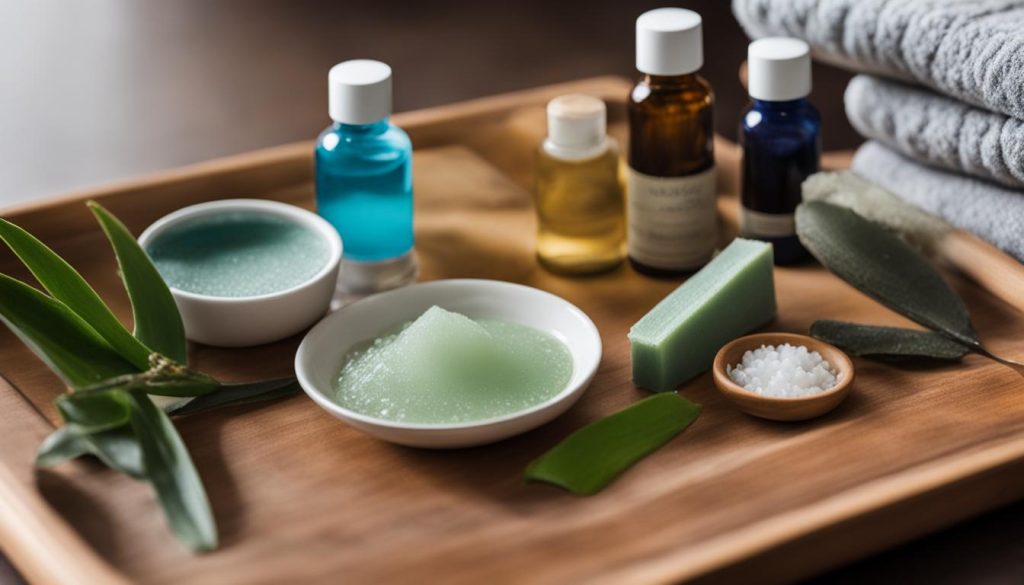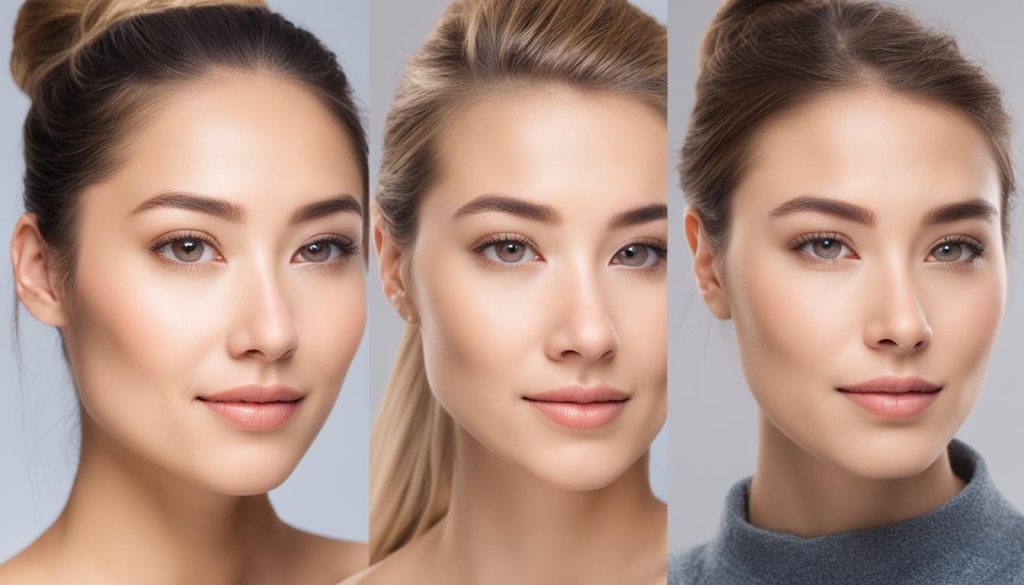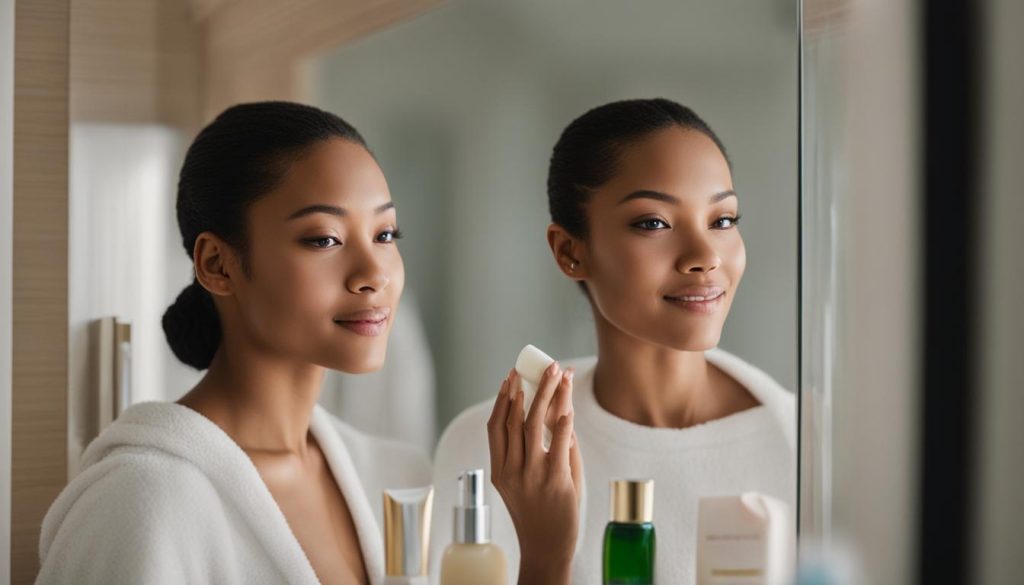In the world of beauty and wellness, the term ‘skincare routine’ almost invariably includes the regular use of a cleanser or face wash. Yet, my personal voyage through the realm of minimalist skincare has led me to a rather unorthodox question: could natural skincare, perhaps, mean omitting the facial cleanser altogether? Tossing aside my usual array of foams and gels, I ventured into uncharted territory, replacing my cleanser with micellar water and plain water. To my astonishment, my skin responded with visible approval, further prompting me to dig deeper into this phenomenon.
Discussing the potential benefits and risks of such an approach with established experts like Angela Kim, Julia Dalton-Brush, and Cristi DiBernardo enlightened me on why my skin might be thriving under a minimalist regimen. It turns out that the common practice of daily face washing with typical skincare products might not be the golden standard for everyone. Instead, listening to one’s skin and customizing the care it receives could lead to remarkable improvements. After all, skincare tips aren’t universally applicable. Could it be that our skin is begging for a break from the routine we’ve so diligently followed?
Embarking on this exploration required careful consideration and an openness to learn, evaluate, and potentially overhaul long-held beliefs about what constitutes effective skincare.
Key Takeaways
- Minimalist skincare can challenge traditional beliefs about necessary daily practices for maintaining skin health.
- Using natural skincare methods like micellar water and plain water might be beneficial for some skin types.
- Expert insights on conventional cleansers suggest that selecting products tailored to an individual’s skin is crucial.
- Improvements in skincare can sometimes come from less, rather than more, complex skin care routines.
- Overhauling skincare practices should be approached with personal awareness and professional advice.
The Surprising Effects of Not Washing Your Face
Embarking on the journey of minimal skincare by not washing face has led to the discovery of astonishments I never thought possible. It began accidentally yet unfolded a new chapter of my skincare regime, one that seemed counterintuitive yet has proven remarkably beneficial. The day I stopped washing my face with conventional cleansers, I embarked on an unexpected adventure in skincare.

The decision to stop washing your face can come with trepidation amidst a plethora of skincare tips suggesting otherwise. Yet, my face looks better when I don’t wash it, surprisingly enough. After a week of not washing my face for a week – thanks to a forgotten bag of toiletries during vacation – my skin began to express its gratitude. It achieved a glowy, bouncier, and more hydrated state; it was as if I had uncovered the benefits of not washing your face all by a stroke of serendipity.
My Personal Journey: Improvement in Acne and Skin Texture
In the throes of summer’s heat, where once my skin would succumb to oiliness and shine, it now embraced a balmy glow, a texture that spoke of balance and health. By simply using micellar water for makeup removal, I freed my skin of the cyclical turmoil of feeling too dry or too oily. This newfound equilibrium whispered a secret; sometimes, doing less is indeed more – my resolution to i don’t wash my face regularly paid off.
Real Stories: Positive Skin Changes from Going Cleanser-Free
My sentiments were echoed by a close companion who, upon choosing to stop washing their face with traditional products, noticed a significant decline in dermatitis flare-ups. Their experience served as a reinforcing testament to the idea that the act of not washing face for a month, or even at all, could be not just a passing fad but a healthier long-term practice for some. Never wash face might sound extreme but offers an introspective look into how we treat our skin.
- Reduction in skin irritation when i stopped washing my face with harsh cleansers.
- Observance of natural skin oils balancing out after the decision to stop washing your face.
- Unanticipated compliments as a result of a more nurtured, not washing face regimen.
As weeks stretched into a month, the clarity of the message became crystal clear: the skin, when not antagonized by astringent products, can thrive beautifully. Harnessing the benefits of a gentler approach like this may not be universally applicable, but for my narrative, it unfolded a chapter of revival and wellness for my complexion.
Expert Insights on Face Washing and Acne
In my quest to demystify the complex relationship between acne and our skincare routines, I discovered that understanding an individual’s skin type is paramount. Below, I explore the diverse advice of seasoned skincare professionals, enriching the narrative with their perspectives on whether forgoing traditional face washing can assist in achieving clearer skin.
Understanding Acne Triggers and Cleanser’s Role
Angela Kim, a renowned skincare expert, suggests that using harsh products can be one of the critical skincare routine mistakes leading to aggravated skin conditions. It raises the question, “does not washing your face help acne?” Not necessarily, but there’s a clear relationship between skin health and using the correct type of cleanser. To reap the benefits of washing your face, it’s crucial to choose cleansers that are formulated to nourish rather than strip the skin, balancing its natural oils and preventing the overproduction that often leads to acne.
The Myth of the ‘One Size Fits All’ Skincare Routine
Julia Dalton-Brush and Cristi DiBernardo further shed light on the topic by emphasizing that the idea of a universal skincare routine simply doesn’t hold water. For me, and many others, the discovery that over washing could be impairing our skin rather than helping it was a revelation. It turns out, taking a more minimalist and targeted approach may yield the clear skin we’ve been striving for. Driven by this concept, I’ve learned that my skin prefers a gentler touch and responds better to hydration and nourishment, rather than aggressive cleansing.
Integrating skincare tips for clear skin from multiple authorities in the field has taught me that personalization is key. A diligent and thoughtful skincare routine hinges on finding that sweet spot, where each product and practice harmoniously aligns with your skin’s unique needs and characteristics.

- Assessing your personal skin type and its response to various cleansing methods.
- Exploring gentle, nourishing alternatives to traditional face washes.
- Understanding the importance of preserving our skin’s natural barrier.
In conclusion, while it might be tempting to follow the latest trend or celebrity-endorsed regimen, the experts concur that steering away from a cookie-cutter skincare routine and embracing a tailored approach is more likely to foster a healthy, acne-free complexion.
The Truth About Cleansers and Skin Barrier Health
During my exploration into more conscious skincare practices, I’ve discovered that the delicate balance of our skin’s health is often at the mercy of our daily routines. The consequences of over-washing your face cannot be overstated. It’s something that Rashida Hassanali of Schweiger Dermatology Group has emphasized repeatedly. My conversation with her delved into the intricate ways we inadvertently contribute to skincare routine mistakes, particularly concerning the health of our skin barrier.
The Potential Harm of Overwashing
It’s clear that understanding how to maintain healthy skin involves recognizing the signs of over-cleansing. Hassanali pointed out that over-washing strips away not only impurities but also the essential oils that maintain our skin’s natural defenses. This can pave the way for a host of issues, leaving the skin vulnerable to breakouts and dryness. She advocates for a cleansing routine tailored to individual skin needs, which may mean washing less frequently than we’re accustomed to. In some cases, using washing face with only water could be a game-changing skincare tip to consider.
- Appreciate the skin’s need for balance and avoid disrupting its natural state.
- Be mindful of the frequency and technique of cleansing to protect the skin barrier.
- Consider avoiding harsh cleansers that strip the skin of necessary oils and lipids.
How Cleansers Can Affect Your Skin’s pH Balance
Transitioning towards a natural skincare approach means considering products that are in harmony with our skin’s pH level. Hassanali warns of cleansers with harsh ingredients that can act similarly to a detergent on our face, disrupting not only the pH balance but also moisture levels. The comparison was particularly alarming, highlighting the need for a gentle approach. Through this deeper understanding, I’ve been led to probe into the very formulations of cleansers, focusing on those designed to support, not disrupt, the skin’s natural state.
- Select a cleanser that complements your skin’s pH balance and maintains moisture.
- Adopt a skincare approach that encourages the use of gentle, hydrating ingredients.
- Embrace the benefits of natural skincare products without harsh chemicals.
These discoveries have reshaped my perspective on skincare tips and reinforced the significance of adopting a personalized and informed skincare routine, particularly when it comes to the ritual of face washing. Whether it’s simplifying to washing with just water or finding a cleanser that fortifies the skin barrier, the journey to healthier skin is anything but one-size-fits-all.
How Skipping the Face Wash Can Benefit Your Skin
My journey into the realm of skincare has led to some surprising revelations, especially regarding the benefits of not washing my face with traditional cleansers. After much deliberation and experimentation, I found that the absence of these products from my oily skin care routine not only improved the hydration and texture of my skin but also endowed it with a natural radiance that I hadn’t seen in years.
In the pursuit of a simplified regimen, I discovered several compelling natural face cleansing methods that seemed to favor my skin’s innate balance. Here’s what I observed:
- My skin retained moisture better without the harsher components of conventional face washes.
- There was a noticeable enhancement in my skin’s natural glow, possibly due to oils left undisturbed.
- My skin appeared to self-regulate its oil production more efficiently, reducing the occurrence of that midday shine.
This approach was not without its skeptics, but the results spoke for themselves. As someone who has grappled with oily skin for most of my life, it was enlightening to let go of the belief that constantly trying to remove oil was the only way to care for it.
Focusing on gentle exfoliation and hydration instead of daily scrubbing with detergents has been liberating. Ultimately, listening to my skin’s needs rather than adhering to rigid skincare doctrines has led to a more balanced, vibrant complexion that I’m excited to maintain using these newfound methods.
Should I Stop Washing My Face? Lifestyle Considerations
Embarking on a minimalist skincare journey, I’ve contemplated the impact of scaling back my skincare routine to harmonize with my daily life and personal values. The inclination towards a simplified, no face wash routine not only reflects my desire for a natural skincare approach but also aligns with my pursuit of minimizing excess in all aspects of living. It’s a transition that nods to a broader cultural shift toward intentional living, where every product on my bathroom shelf must justify its place in my regimen.
Adapting Your Skincare to Your Daily Habits
As someone who values efficiency, incorporating minimalist skincare principles means carefully considering the products that make up my skincare routine. Stripping back to the essentials—perhaps forgoing the foamy lather of a cleanser for just water and a cloth—suggests not only a potential cutback on spending but also a reduction in the time I dedicate to my morning and nightly rituals. This approach begs the question: can we achieve optimal skin health with less, and if so, which skincare steps are indispensable, and which can we skip?
When Minimalism Meets Skincare: What’s Necessary and What’s Not
In an era where natural skincare is not just a trend but a lifestyle, it’s been enlightening to observe the outcomes of reducing my skincare arsenal. Less frequent face washing or opting for gentler alternatives could be advantageous skin care tips, especially if traditional products have been unkind. Despite the prevailing notion that more is better, adhering to minimalist skincare has taught me to listen to my skin, avoiding skincare mistakes to avoid such as over-washing that may disrupt my skin’s harmony. By selecting only what my skin truly needs, I maintain its health, balance, and luster, reaffirming that sometimes, in skincare as in life, less can indeed be more.
FAQ
Could stopping regular face washing improve my skin’s health?
It’s possible. Some people find that reducing or eliminating the use of traditional cleansers can decrease skin issues like dryness and acne, as the skin can maintain its natural oils and balance. However, this approach is not suitable for everyone and should be tailored to individual skin types.
What are the benefits of not washing my face with conventional cleansers?
Not using conventional cleansers can lead to increased hydration, a reduction in oiliness, and a potential improvement in overall skin texture. A minimalist skincare routine can also align with natural skincare principles and can be economical and time-saving.
Do all skin types benefit from stopping the use of facial cleansers?
No, the benefits vary depending on the individual’s skin type and condition. While some may experience positive changes, others may not. It’s important to understand your skin and consider consulting a dermatologist before making significant changes to your skincare routine.
How can I clean my face without using a traditional face wash?
Micellar water, plain water, or natural face cleansing methods like oil cleansing can be effective alternatives. Additionally, using a liquid exfoliant or toner followed by a suitable moisturizer can help maintain clean and hydrated skin.
Is it harmful to wash my face only with water?
Washing your face with just water can be sufficient for some people, especially if the water alone effectively removes dirt and doesn’t leave the skin feeling tight or dry. However, it may not be enough for removing makeup or sunscreen, and some skin types might require additional cleansing products.
What skin concerns might arise from over-washing my face?
Over-washing can strip your skin of its natural oils, leading to dryness, irritation, and even an increase in oil production as your skin tries to compensate for the loss. This can also disrupt the skin’s pH balance, affecting its barrier function and potentially causing acne or other skin issues.
How can a minimalist skincare routine benefit my skin?
A minimalist skincare routine focuses on using fewer products that are essential for maintaining skin health. This can help your skin function optimally without the adverse effects of overuse or the wrong combination of products. Listening to your skin and making adjustments as needed is key to a successful minimalist approach.
How often should I wash my face to maintain healthy skin?
The frequency of face washing should be personalized based on your skin’s needs. Some may benefit from washing twice a day, while others might find once a day or even less frequently to be sufficient. It’s best to observe how your skin responds and adjust accordingly.
Can not washing my face help with acne?
It’s possible that not washing your face with harsh cleansers could help with acne by maintaining the skin’s natural oils and avoiding irritation. However, acne is a complex condition with various triggers, so this approach might not work for everyone and could potentially worsen acne for some.
What are the key considerations when creating a no face wash routine?
When creating a no face wash routine, consider the specific needs of your skin, any existing conditions, and your lifestyle. It’s also important to slowly phase out products to monitor your skin’s reaction and to include steps that ensure your skin remains clean, such as using micellar water or exfoliating toners.






